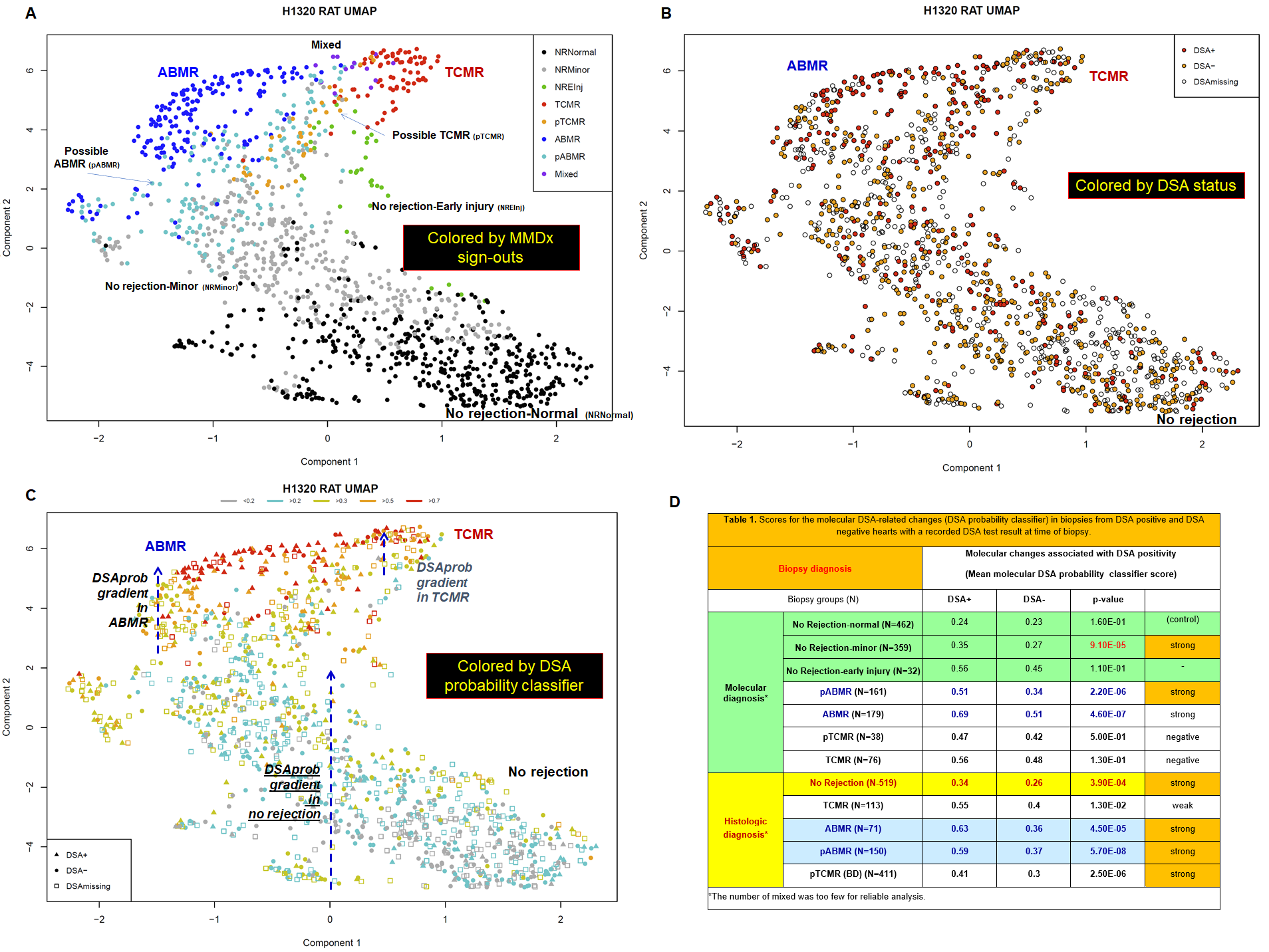DSA is Associated with Molecular Changes in Many Hearts with Minor Abnormalities but Not Diagnosed as Antibody-Mediated Rejection
1Alberta Transplant Applied Genomics Centre, Edmonton, AB, Canada, 2., ., AB, Canada
Meeting: 2021 American Transplant Congress
Abstract number: 143
Keywords: Alloantibodies, Heart, HLA antibodies, Rejection
Topic: Clinical Science » Heart » Heart and VADs: All Topics
Session Information
Session Name: Do's and Don'ts of Heart Transplant Care
Session Type: Rapid Fire Oral Abstract
Date: Sunday, June 6, 2021
Session Time: 4:30pm-5:30pm
 Presentation Time: 4:35pm-4:40pm
Presentation Time: 4:35pm-4:40pm
Location: Virtual
*Purpose: We previously developed a microarray-based diagnostic system (MMDx) for heart transplant endomyocardial biopsies, measuring gene expression and interpreting antibody-mediated and T cell-mediated rejection (ABMR, TCMR) using machine-learning classifiers. The present study aimed to determine whether DSA induced mild ABMR-related changes in hearts not diagnosed as rejection.
*Methods: The multicenter INTERHEART study NCT02670408 included 1320 biopsies (645 patients) assessed by MMDx; 824 biopsies had DSA measured at time of biopsy. Figure 1 plots biopsies’ molecular distribution using Uniform Manifold Approximation and Projection (UMAP) based on rejection-associated transcript scores as inputs, colored by various features.
*Results: Using published rules, MMDx subdivided biopsies with No-rejection into Normal, Minor, and Early injury (fig 1A). DSA was associated with ABMR but was positive in many biopsies with No-Rejection (fig 1B).
A “DSAprob” molecular classifier was developed to estimate probability of DSA positivity and detect DSA-related and ABMR-related transcript changes. DSAprob predicted ABMR (AUC 0.90) better than DSA positivity (AUC 0.72) because some DSA does not produce molecular changes. DSAprob was strongly associated with ABMR-related NK cell (e.g. CCL4, KLRD1) or IFNG-inducible (e.g. TAP1, PLA1A) transcripts.
DSAprob detected a gradient of mild molecular changes in biopsies with No rejection, particularly those with Minor changes (fig 1C). DSAprob in No rejection biopsies correlated with DSA positivity.
In Table 1, DSAprob was low in pristine No rejection-Normal biopsies, even if DSA positive, but mildly increased in many No-rejection-Minor biopsies, particularly when DSA-positive (Table 1). DSAprob was also increased in histology No-rejection when they were DSA positive. DSAprob scores were highest in DSA positive biopsies with ABMR but also in TCMR (Table 1).
DSA positive biopsies with No rejection had mildly elevated transcript set scores and classifier scores related to ABMR, but not to TCMR or injury. No rejection biopsies from DSA positive patients had elevated NK and IFNG-inducible transcripts compared to DSA negative patients.
*Conclusions: Thus DSA is associated with mild molecular ABMR-related changes in many hearts not currently diagnosed clinically or histologically as ABMR, particularly those with Minor changes. Thus DSA stress on the microcirculation is considerably more widespread than previously appreciated. ClinicalTrials.gov NCT02670408 (heart).
To cite this abstract in AMA style:
Halloran P, Madill-Thomsen KS. DSA is Associated with Molecular Changes in Many Hearts with Minor Abnormalities but Not Diagnosed as Antibody-Mediated Rejection [abstract]. Am J Transplant. 2021; 21 (suppl 3). https://atcmeetingabstracts.com/abstract/dsa-is-associated-with-molecular-changes-in-many-hearts-with-minor-abnormalities-but-not-diagnosed-as-antibody-mediated-rejection/. Accessed February 18, 2026.« Back to 2021 American Transplant Congress

